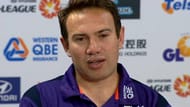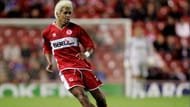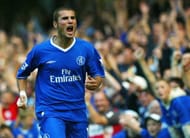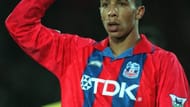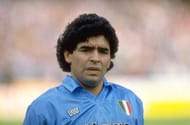As a general rule – particularly in the modern game – professional footballers are extremely clean cut when it comes to what they are prepared to put in their bodies. Gone are the days when it was acceptable to drink heavily or take drugs the night before a big game. Such are the demands of the game these days that it would be too easy to identify anyone suffering from the effects of a hangover or a comedown – but that doesn’t mean some footballers don’t fall foul of temptation.
Every now and again, whether it be through a momentary lapse in concentration or through prolonged abuse, footballers will be caught out consuming or using substances they shouldn’t – and that includes drugs. We list ten footballers who were not only caught using drugs, but who were banned from the game for doing so.
10) Edgar Davids
Edgar Davids, who is now 42, only officially retired from professional football in 2014, after having ended his career as player-manager of lowly English team Barnet. But his career was in jeopardy as far back as 2001 when he tested positive for the banned steroid Nandrolone during his stint at Juventus. The Dutch midfielder was expected to be banned for 16 months, which would have seen him miss the 2002 World Cup.
However, Davids appealed against the ruling and it resulted in the reduced punishment of a four-month ban. The midfielder had been fighting for the cancellation of the suspension by claiming that homeopathic medicines were to blame for the high levels of nandrolone in his system.
9) Jake Livermore
The most recent high-profile case of a footballer being banned for taking drugs comes in the form of Jake Livermore. The Hull City midfielder tested positive for cocaine in May of this year and was subsequently suspended from football for the remainder of the Premier League season, pending further investigation. The case is still ongoing and it remains to be seen exactly what will come of it.
25-year-old Livermore – who earned one England cap back in 2012 – was Hull’s record signing when he joined the club permanently for around £8 million from Tottenham Hotspur in 2014, but he faces potentially being sacked from the relegated club should further investigation categorically prove his abuse of the Class A drug.
8) Stan Lazaridis
Former Australian international, West Ham United and Birmingham City winger Stan Lazaridis was given a 12-month suspension from the game in 2007 when he tested positive for the prescription alopecia medication anti-androgen Finasteride. The substance was banned at the time and even though Lazaridis made it clear that it had been used in good faith, without knowledge of it being illegal and that it wasn’t a performance-enhancing drug, his suspension went ahead anyway.
Lazaridis was playing for Perth Glory in his homeland when the ban was applied. Given that he was 34-years-old at the time, he opted to retire from the game instead of waiting for his suspension period to end to return to the game.
7) Deco
The case of Deco is a somewhat unique one, in the sense that his ban came after he had retired, but he still chose to appeal it. The former Portugal, Porto, Chelsea and Barcelona midfielder spent his final playing days at Fluminense in Brazil and retired in August of 2013, just shy of his 36th birthday.
He had tested positive for traces of furosemide – a diuretic that can be used to mask traces of other substances – in March. But he kept playing until four days prior to his retirement, with the ban officially being implemented after that.
Deco insisted that the positive test was the result of a contaminated vitamin supplement and pleaded his innocence, hoping to overturn the ruling in spite of the fact that he had already stopped playing and the ban essentially wouldn’t have even happened.
6) Abel Xavier
Abel Xavier was probably best known for his crazy hairstyles and beard, but the player will also be remembered in a more negative light due to his 18-month ban for taking anabolic steroids. The Portuguese international defender was playing for English side Middlesbrough at the time and, following a UEFA Cup tie in 2005, tested positive for the banned substance dianabol.
As a result, Xavier – a well-travelled player whose former clubs include the likes of Benfica, Bari, Real Oviedo, PSV Eindhoven, Everton, Liverpool, Galatasary, Hannover 96, Roma and Los Angeles Galaxy – became the first player in the Premier League to be banned for a non-recreational drug.
5) Adrian Mutu
Romanian international striker Adrian Mutu was an extremely talented and promising young player when he signed for Chelsea in August of 2003, but he ruined his Premier League career after failing a drugs test for cocaine and was released just over a year later in October of 2004. Mutu was banned for seven months as a result and fined £20,000 by the Football Association.
He returned to football with Juventus and went on to play for the likes of Fiorentina and Cesena. Now 36, his last club was FC Petrolul Ploie?ti in his homeland, where he didn’t live up to expectations – and a move to India with FC Pune City fell through last year when FIFA refused to sanction the deal.
4) Jermaine Hue
Jermaine Hue was a Jamaican international midfielder whose career was mostly spent in two stints with Harbour View in his homeland – with brief forays into American and Swedish football with Mjallby and Kansas City Wizards in between. Now 36, Hue has recently retired, but it all nearly went very wrong for him back in September of 2013.
He was banned from football for nine months – when he was already 35 – for testing positive for a banned substance after a World Cup qualifier against Honduras. That substance was dexamethasone – a type of steroid – and the resulting ban left him out of shape.
Getting back into the game proved difficult at his age and he called time on his career in May of 2015.
3) Chris Armstrong
The case of Chris Armstrong highlights just how much football has cracked down on drug use a lot more in recent years. Armstrong was a 23-year-old Crystal Palace player when he tested positive for cannabis in March of 1995. In doing so, he became the first ever Premier League player to fail a drug test and he received a ban as a result.
However, after attending a brief rehabilitation programme, he returned to the pitch in less than a month. That very same year, following Crystal Palace’s relegation to the old First Division, he signed for Tottenham Hotspur for £4.5 million, making him the club’s record signing and the most expensive player to ever leave Crystal Palace at the time.
2) Gerard Kinsella
Gerard Kinsella is proof that lower-level football is monitored just as much as top-level and international football when it comes to drug use. The Fleetwood Town midfielder was banned from football for two years in June of 2013 after testing positive for an anabolic steroid.
The former Everton prodigy was just 21 at the time and maintains to this day that the use of the steroid wasn’t deliberate and that he had innocently received an injection to help with the pain of a chronic shoulder injury. Last year, Kinsella was allowed to resume training with a football club with a view to returning to the game when his ban comes to an end this year.
But Kinsella has yet to sign with anyone and his hopes of emulating the likes of his former Everton youth team colleage Ross Barkley look increasingly slim.
1) Diego Maradona
Without question, the most high-profile case of a footballer being banned for drugs comes in the form of Argentina legend Diego Maradona – and in his case it happened twice. Maradona was first banned from football in 1991, whilst playing for Napoli in Italy, when he tested positive for cocaine. He served a 15-month ban and left the club in disgrace to sign for for Sevilla in Spain.
Three years later, Maradona was banned from the game again – this time whilst a Newell's Old Boys player – after failing a drug test for ephedrine doping during the 1994 World Cup. He played two games in that tournament before being sent home as a result of his test proving positive.
Given that he’s one of the greatest players of all time, one has to wonder just how great his legacy would have been without such scandal.


